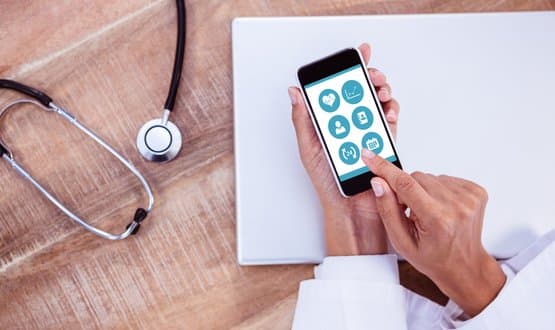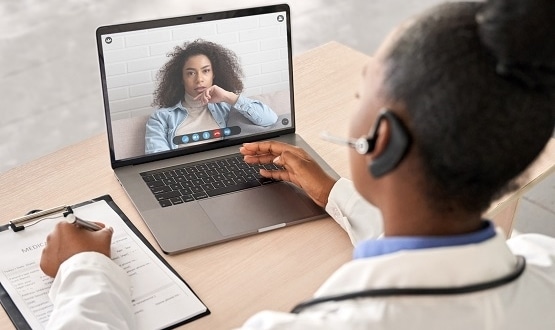A 24-hour ‘video chat app’ aiming to slash waiting times launches across London

A smartphone app which gives patients the option to video chat with their GP has been launched in London.
The free NHS, GP at Hand service, promises to cut waiting times by allowing patients to book appointments and talk to their doctor through their smartphones.
A handful of practices across the capital are to begin trialing the service which also gives patients the option of having prescriptions delivered to a pharmacy of their choice.
A spokesperson from NHS England said: “We want to ensure that all patients have access to high quality primary care when they need it.”
“GP at hand is using new technology in an innovative way to provide care to patients who register with it by using both online and face to face consultations where necessary.
“A clinical review of the service has suggested that there may be real benefits for some patients – what is important now is to understand who the service is most appropriate for, and to fully evaluate the effectiveness of the approach.”
GP at hand, which is powered by digital health provider Babylon, will verify patients’ identification before they can start booking appointments.
Those who live in London within zones one, two and three are currently eligible to register.
Once a patient has successfully registered, their registered GP practice will become the GP at Hand practice and the service does not cost any more than it does for GP registrations at traditional surgeries.
Dr Mobasher Butt, GP at Hand partner, said: “We do everything from grocery shopping to our banking online yet when it comes to our health, it can still take weeks to see a doctor and often means taking time off work for an appointment.”
“With the NHS making use of this technology, we can put patients in front of a GP within minutes on their phone, so the days of ringing frantically at 8am for an appointment should be long gone.”
He said the new NHS service makes it easier for patients to see a doctor quickly at anytime and from anywhere and doesn’t cost the NHS a penny more.
“It’s a win win,” Butt said.
However, the launch of the app has been met with criticism with the Royal College of GPs claiming the scheme simply ‘cherry-picks’ the best patients.
Professor Helen Stokes-Lampard, chair of the Royal College of GPs, said while some patients will see this as a ‘golden ticket’ to get quick and easy access to a GP – for younger, healthier commuters “it could prove a solution to long waiting times for an appointment.”
“Technology can achieve wonderful things when used properly, but we are really worried that schemes like this are creating a twin-track approach to NHS general practice and that patients are being ‘cherry-picked’, which could actually increase the pressures on traditional GPs based in the community,” Stokes-Lampard said
This month, NHS England launched a £45 million fund to help GP surgeries implement online consultation programmes.
Speaking on the second day of EhiLive on 1 November, head of general practice development at NHS England, Dr Robert Varnam, said the money will be used to implement an online consultation programme for three years across a number of GP practices.
Calling online consultations ‘exciting’, Varnham added: “The future of primary care cannot look like it is now and patient facing technology is a key part of helping the pressure in primary care.”
Visit the GP at Hand website if you are interested in signing up.





23 Comments
SO – how about a radical idea? GP Practices offer this service? They already do telephone calls to patients to avoid having to come into the practice and I’m sure a lot of GP system suppliers could create or already have the necessary functionality. No cherry picking of patients then – they could use this alongside the telephone consultations, the on line consultations (the practice I’m with already offers this) and the visit.
The problem would be the lack of GPs’ time.
Remote consultations usually take longer than face-to-face ones, so overall fewer patients would be ‘seen’.
Now if there were plenty of GPs around, it would certainly be a service improvement, but as Jeremy Hunt’s magic extra 5000 GPs have yet to materialises, and last year 1000 GPs left the NHS, it’s not going to be practical in the foreseeable future.
I hadn’t thought of the length of the consultation being longer. Thanks for pointing that out. I wonder though if this company can find enough GPs to do this job why the GP practices can’t do it – oh hang on – that will be because they get paid to do it but they’ve cherry picked the patients who won’t cost them much but they will get the standard rate for.
Spot-on!
Fortunately, many real NHS GPs and clinics have piloted these: Here is the first peer-reviewed analysis:
https://t.co/PAKYE8C1Wo
So a limited set of use cases, though political attraction risks trumping the evidence again.
“However, if the public want services like this then Babylon are merely providing it.”
It seems they don’t, as the plug has now been pulled!
Naughty patients clicking through to avoid third-rate app chats/videos, to get face-to-face [proper] consultations. Obviously too expensive for the provider to be able to profiteer.
It has been pointed out previously that to find out who really benefits from an action follow the money
That’ll be the Egyptian investors then….
Being expicit about the selection of fit and easy patients does not make it acceptable for a service that benefits from NHS branding, infrastructure such as EPS, and funding from the same pot so defunds the remaining services provided by real GPs.
Yes real GPs – because this also “passes off” these GP-trained cyber-doctors as if they are real GPs serving a real community by co-ordinating local resources.
This service should be explicitly private, to introduce funding from the user for their own convenience, as a top-up model to the real NHS.
This is a practice, like any other GP surgery. So, sending prescriptions to a pharmacy IS just EPS. It’s essentially a GP practice delivering the majority of their appointments via digital services.
Yes, it’s disruptive to the funding model for GPs, and yes, it’s going to cherry-pick patients that can be handled by this delivery model. Either the NHS needs to change its financial model to accommodate services that improve patient convenience for those who do not have LTCs and drug dependencies etc… or surgeries start closing and patients suffer because the business becomes unsustainable.
Just seems weird that Babylon aren’t trying to convince practices to use this technology, instead they want to be a competitor to practices?
To me, GP at Hand seems like a hammer, when the NHS needs a series of different chisels.
Will be interested to see what happens with this.
There are conflicting studies as to whether video consultations (and even telephone triage) saves any time / increases efficiencies in primary care.
However, if the public want services like this then Babylon are merely providing it. It could very well be a hugely popular success in this case.
The question that remains however is whether this is good for the NHS itself. It’s unlikely to make any meaningful difference in waiting times and solve the fundamental problem of England not having enough medical professionals. England has one of the lowest doctors per capita of the population in the developed world. A video chat app isn’t going to change this.
Yes – patients will be deregistered from their usual GP practice but registered with the “GP at Hand” practice as an “out-of-area” patient.
( https://www.bma.org.uk/advice/employment/gp-practices/service-provision/out-of-area-registered-patients )
Such patients are not entitled to home visits should they be too unwell to come to the surgery. Not sure who would see them during core hours, but the GP visiting would not have access to their full GP record.
GP at Hand also retains the right to remove them from their list as soon as they become “too complex” (e.g. pregnant). They will be deregistered and will have to sign up to another practice (or back with their previous one I imagine).
No, it good that they are up-front about who they can’t help and as I said i’m sure such services have a role and will expand the range of the patients they can support.
My concern is that it’s yet another technology that’s being over-hyped
May be good for the patients. However potentially very bad for primary care. Normal GP surgeries have to accept all patients, they can’t cop out of seeing the patients who are tricky. Babylon have won a GAME contract which should mean that they should have to see all patients.
The funding for primary care is a zero sum game, so if Babylon steal the easier patients it leaves traditional GPs in a much worse position as they’ll not only lose patients (and therefore money), but also have to deal with the more complex patients.
This at a time when primary care is collapsing and GPs are leaving could be very bad for the NHS.
I don’t think that anyone is saying that these services shouldn’t happen, but it should be done in a fair way and not in a way the penalises other healthcare providers who are sticking with the rules set out by the NHS itself…
Sorry not a GAME contract – meant to read GMS Contract
If you visit the site you find that, unlike any other NHS practice, they appear to be picking low-risk, non-complicated patients. The following are suggested to be ‘less suitable’ .
*Women who are or may be pregnant (If you are pregnant, NHS England advises that you register with a GP practice close to where you live)
* Adults with a safeguarding need
*People living with complex mental health conditions
* People with complex physical, psychological and social needs
* People living with dementia
*Older people with conditions related to frailty
*People requiring end of life care
*Parents of children who are on the ‘Child at risk’ protection register
* People with learning difficulties
*People with drug dependence
I feel this is not the comprehensive GP service that people might think and, as soon as you move into one of those categories I assume you will be sent back into the ‘normal’ GP services. As a result the claim that they cost the same might be considered to be only partially true given the reduce coverage of complex cases.
I’m sure there is a role for this sort of digital service, but if you look at where the demand for GP services come (and where the NHs cost is) It’s in the groups listed above and if digital tech is to have a material impact it has to be able to address some of these groups.
It seems to me that some of these are reasonably excluded from this service as it’s unlikely to meet their needs but other could find such a service useful and it rather feels as if they are excluded to improve the chances of “success” After all delivering a successful digital service to the worried-well is not going to be that hard
I agree Ewan that there can be a disjunct between digital health tech and the high resource-demand populations for the NHS.
InterCare from Nimbus Medical delivers digital health benefits via a simple and accessible UI for the elderly and vulnerable. Particularly useful in supporting and managing long term condition patients in their own homes or care homes, InterCare is accessed via TV or Mobile tablet platforms. This makes the combined benefits of video consultation, telecare and serving of self-care content practical to higher cost, offline NHS groups.
I’m wondering what you think is wrong with them being up-front about what they can and cannot deal with? It seems eminently sensible that they set out the parameters of what they’re willing and able to deal with. For the people who fall into the categories they list, then their registered GP is the natural place to go. For those who feel that the service they’re offering is right for them, and if they don’t fall into the “excluded” categories, then why not use them?
You are so right but is this not Babylon marketing speak to make prospective transferrees think that they are receiving extras, next step tell clients that delivery can be arranged by certain pharmacies
Not sure what is meant by “also gives patients the option of having prescriptions delivered to a pharmacy of their choice.”
The NHS EPS already does this by routing prescriptions to the patient’s nominated pharmacy. So have the NHS enabled GP at Hand with the ability to set a nomination?
Currently that is done by the patient via their GP or chosen pharmacy……..
I bet that it only works on android and iOS phones, I love my windows 10 phone
The traditional NHS only works on fax machines.
Comments are closed.